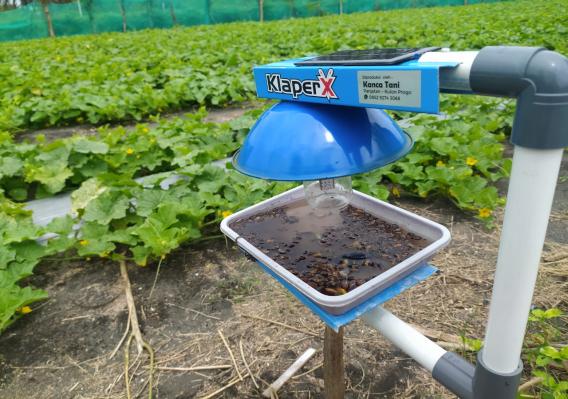Students of Universitas Negeri Yogyakarta (UNY) Create Light Trap Insect, an Environmentally Friendly Solution to Control Agricultural Pests

Three students from UNY have created an eco-friendly innovation to help farmers control pests effectively without relying on chemical pesticides.
Through the 2025 Student Entrepreneurship Development Program (P2MW) of the Ministry of Higher Education, Science and Technology, the team—consisting of Ihsan Muchlis Amirudin, Afwa Naela Fauzia, and Rose Pita Nur Afifah—developed a device called the Light Trap Insect (LTI). The LTI is a solar-powered automatic pest trap that supports sustainable agriculture.
The idea came from concerns about the heavy use of pesticides among farmers which negatively impacts health, harvest quality and ecosystem balance. “We wanted to provide a simple, energy-efficient, environmentally friendly solution that farmers can use immediately,” said team leader Ihsan Muchlis Amirudin.
The device works automatically: during the day the solar panel stores energy, and at night the ultraviolet lamp turns on to attract nocturnal insects like moths or small flies which often damage crops. The insects fall into a soap-water container and are trapped. The soap-water is replaced daily to maintain effectiveness.
According to Afwa Naela Fauzia, using the LTI is very beneficial for farmers because it requires no electricity, is water-resistant and can be reused across planting seasons. “By replacing pesticide spraying with LTI usage, farmers can reduce operational costs and chemical residues on crops,” she explained.
Rose Pita Nur Afifah added that the Light Trap Insect has already been registered for Intellectual Property Rights (HKI) for its design and brand. “We hope this device can be produced on a mass scale so that its benefits reach more farmers, especially those still relying on conventional methods,” she said.
The innovation has also been trialed alongside a farmer group and the District Agriculture Office of Kulon Progo, showing significant reduction in nocturnal pest populations and increased productivity of crops such as shallots and chili peppers. The LTI proved effective from the early planting stage by capturing pest parents before they laid eggs, resulting in more optimal plant growth.
Besides supporting agricultural productivity, the innovation contributes to the Sustainable Development Goals (SDGs)—specifically Goal 2 (Zero Hunger / Sustainable Agriculture) and Goal 7 (Affordable and Clean Energy). The LTI is a tangible example of renewable energy being used to improve farmers’ welfare and safeguard the environment.
Through the P2MW UNY program, the students are not only trained to be young innovators but also social entrepreneurs capable of creating economic value and benefiting society. “Innovations by students like this show that eco-friendly technology can be the future solution for Indonesian agriculture,” said Dr. Yudan Hermawan, a lecturer in entrepreneurship at UNY.
The Light Trap Insect is proof that creative ideas from Indonesia’s youth can address global challenges in food security and the environment. With a spirit of collaboration and sustainability, this student project is hoped to inspire other young generations to continue innovating for the welfare of society and the planet.






